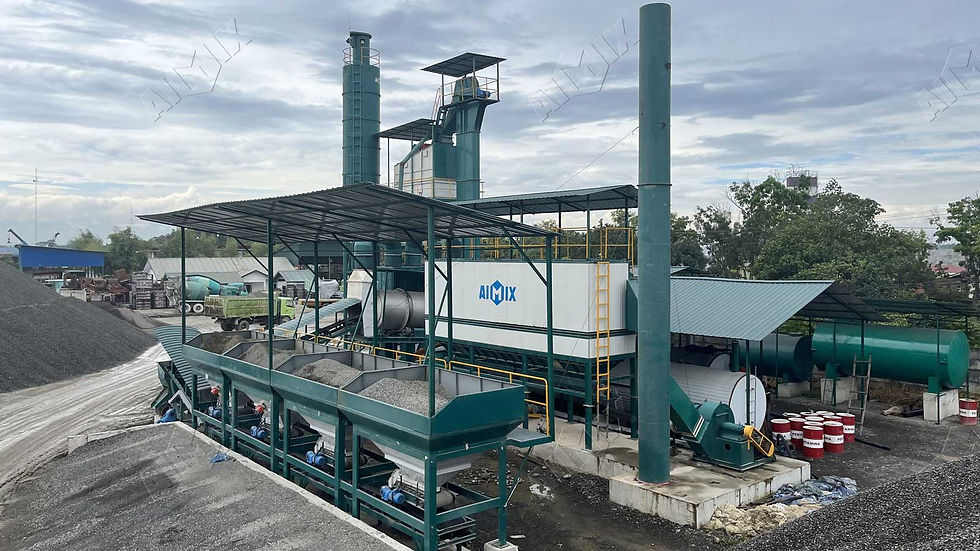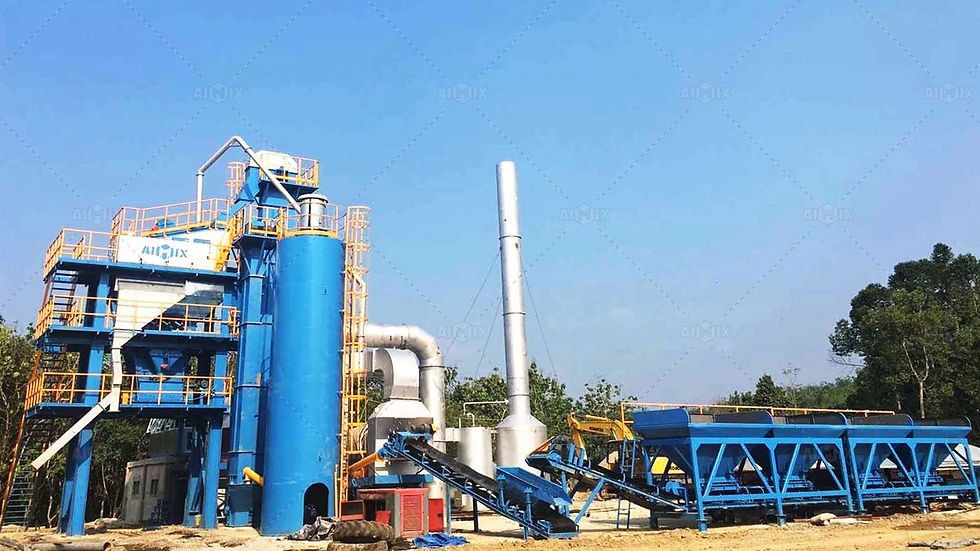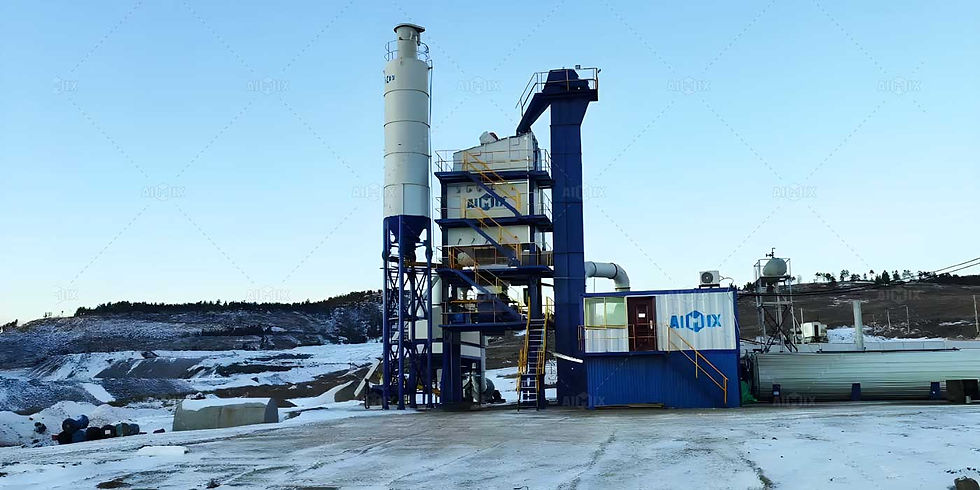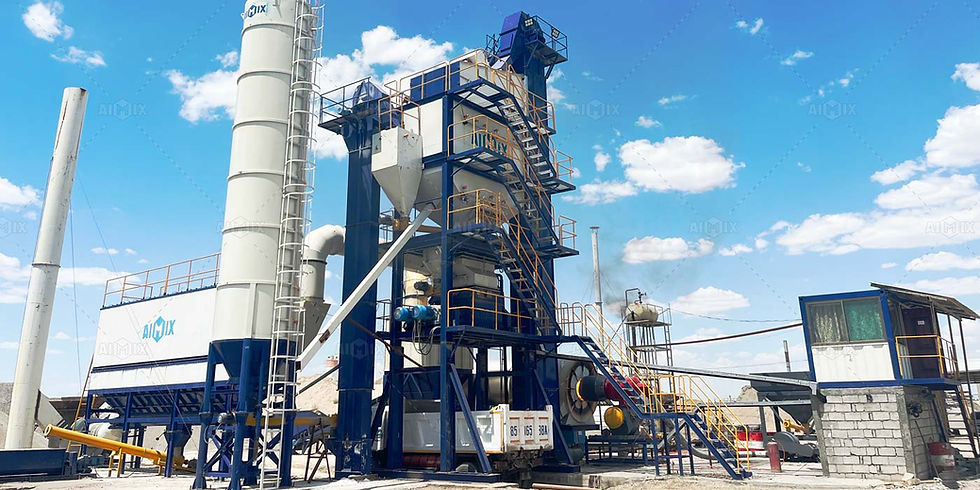Which Asphalt Plant Capacity Allows a Supplier in UAE to Serve Motorway and Bridge Projects Totalling 150,000 Tonnes per Year?
- aimixglobal5
- Nov 4, 2025
- 3 min read
For contractors and asphalt suppliers in the UAE, understanding the right asphalt plant capacity is crucial for successfully completing large-scale motorway and bridge projects. Choosing a plant that matches the project demand ensures timely deliveries, consistent material quality, and cost-efficient operations. With total asphalt requirements reaching 150,000 tonnes per year, selecting the correct asphalt plant for sale in UAE is not just a technical decision—it directly affects project profitability and reputation.

Estimating Asphalt Demand for UAE Road and Bridge Projects
Before deciding on a plant, suppliers must evaluate the total asphalt volume required. Motorways and bridges typically consume high-quality asphalt mixtures, including dense-graded asphalt for surface layers and polymer-modified asphalt for structural resilience. For a combined annual demand of 150,000 tonnes, suppliers need a plant that can handle continuous production without causing delays.
In addition, suppliers should consider seasonal demand fluctuations. During the hotter months, asphalt can be produced faster, but transport challenges increase. In contrast, cooler months may slow down paving schedules but allow longer storage times. Understanding these patterns helps in determining the ideal daily and hourly production rates.

Calculating the Ideal Asphalt Plant Capacity
To meet 150,000 tonnes annually, we can break down the calculation into daily production needs. Assuming a supplier operates 300 days per year, the required daily production equals roughly 500 tonnes. This figure serves as a baseline for selecting a plant capacity.
However, we also need to factor in peak project periods. If multiple sites require simultaneous supply, a higher capacity plant provides flexibility and ensures uninterrupted delivery. Therefore, an asphalt mix plant for sale with a capacity range of 400–600 tonnes per day can comfortably cover annual demand while allowing buffer for unexpected spikes.
Choosing Between Batch and Drum Mix Plants
Suppliers have two main types of asphalt plants to consider: batch mix and drum mix. Batch mix plants offer precise control over material proportions, which is essential for specialized bridge and motorway asphalt mixes. On the other hand, drum mix plants provide continuous production, making them ideal for high-volume road projects with tight schedules.
For UAE suppliers handling 150,000 tonnes per year across multiple sites, a mid-sized drum mix plant can be more cost-effective due to its simplicity and higher output consistency. Yet, if project specifications demand customized asphalt grades for bridges or complex motorway layers, a batch mix plant may justify the slightly higher operational complexity.

Considering Operational Factors for UAE Projects
Plant capacity alone does not guarantee efficiency. Suppliers must also assess transport logistics, storage capabilities, and local climate conditions. For instance, urban motorway projects in Dubai or Abu Dhabi require trucks with precise scheduling to avoid traffic delays. Meanwhile, bridges in coastal areas might demand polymer-modified asphalt that requires specialized mixing temperatures.
Additionally, energy efficiency and automation level play a significant role. Modern asphalt plants with automated dosing systems and energy-saving burners reduce operational costs while maintaining quality consistency. In the long run, these features can improve profit margins even for projects totaling 150,000 tonnes annually.
Maintenance and Reliability Considerations
High uptime is crucial for timely project completion. Suppliers must select plants with reliable components, easy maintenance, and accessible local support. This reduces downtime, prevents costly delays, and ensures continuous supply to motorway and bridge sites. Especially in the UAE, where construction schedules are often tight, plant reliability directly influences client satisfaction.

Making the Right Investment Decision
Based on actual demand, transport logistics, and project requirements, suppliers in the UAE can confidently invest in an asphalt batch mix plant for sale with a production capacity of around 400–600 tonnes per day. Such a plant can efficiently serve motorway and bridge projects totaling 150,000 tonnes per year while offering flexibility for multiple simultaneous sites.
Investing in a plant with slightly higher capacity than the minimum requirement provides a safety margin. This allows suppliers to handle urgent orders, seasonal peaks, or expansion into new road construction contracts without compromising quality or deadlines.
Conclusion: Delivering Reliable Asphalt Supply in the UAE
Selecting the right asphalt plant is a strategic decision for any supplier aiming to serve high-demand motorway and bridge projects in the UAE. By aligning plant capacity with annual asphalt demand, considering local operational factors, and prioritizing reliability, suppliers can secure a steady market presence while maximizing efficiency and profit.
We offer mid-to-large capacity asphalt plants designed to meet the exact needs of UAE projects. Our solutions combine high output, energy efficiency, and precision control, helping suppliers deliver consistent quality asphalt on time and on budget. Contact us today to explore the ideal asphalt plant for your motorway and bridge projects and take your supply capabilities to the next level.



Comments